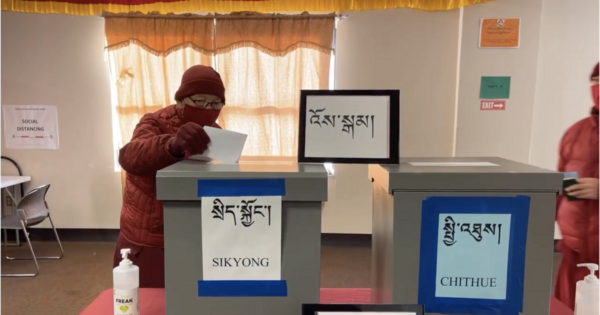Several thousand Tibetans in exile voted on Jan. 3, 2021 in the first round of the two-round elections for the president (Sikyong) and the parliament of the Central Tibetan Administration.
This primary round was to elect candidates for the two offices, with the main elections to be held on Sunday, April 11, 2021. The chief Tibetan election commissioner Wangdue Tsering told media on Jan. 3 that over 80,000 Tibetans had registered for the elections. The voting tally is not yet known.

Ven. Gedun Kesang, a 100-year old Tibetan monk residing in Minnesota voting for the Tibetan elections on January 3, 2021. Photo from TAFM video.
Among those taking part in this important democratic exercise by Tibetans in the diaspora was a 100-year-old monk, Gedun Kesang, residing in Minnesota.
Announcing the winners
Counting of the primary election votes will take place locally from Jan. 5 to 11, 2021 and the overall results will be announced on Feb. 8. After allowing for withdrawals and the compilation of biodata, the final list of candidates will be announced on March 21, according to the election commission.
After the general elections on April 11, 2021, counting of the votes will be done locally from April 13 to 19, and the overall results will be announced on Friday, May 14.
The new parliamentarians will swear in on Sunday, May 30, 2021. The date for the swearing-in of the new Sikyong is not known.
Voting restrictions in Nepal
In the previous 2016 elections, ICT had coordinated with the International Network of Parliamentarians on Tibet (INPAT) to organize an international observer mission, which commended the process and recommended improvement in existing electoral rules and regulations.
Due to the coronavirus pandemic, this time no such observer mission was possible. In fact, in some areas, early voting took place to meet the safety requirements put in place by the governments concerned.
In Nepal, the Tibetan community in the capital region faced challenges due to official restrictions, but in most other areas, elections were held.
In December, during early voting in the Kathmandu region, some Tibetans, including election officials, were detained and subsequently released by the police.
US commendation of Tibetan democracy
The Tibetan Policy and Support Act of 2020, which became a law on Dec. 27 as part of the Consolidated Appropriations Act, 2021, commends the Dalai Lama for having “overseen a process of democratization within the Tibetan polity and devolved his political responsibilities to the elected representatives of the Tibetan people in exile.” It further says, “Tibetan exile communities around the world should be commended for the adoption of a system of self-governance with democratic institutions to choose their leaders.” Referring to the previous Tibetan elections, TPSA says, “ the Tibetan exile community across some 30 countries held free and fair elections to select political leaders to serve in the Central Tibetan Administration parliament and as chief executive.”

